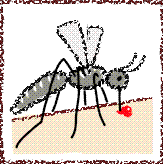Prev: lung disease
Next: dementia

How we let ourselves be infected
(Avoiding infectious diseases, food poisoning, tropical diseases, MRSA and C difficile)
Bacteria and viruses are all around us in unimaginable numbers. An area the size of your fingertip could hold 50,000 bacteria, and even more viruses.
But virtually all of them are
completely harmless. Indeed, bacteria are essential to us in many ways,
such as breaking down rubbish or helping plants turn into compost to
feed our crops.
A very few types of bacteria and viruses can cause diseases
These spread from human to human by direct contact, or in the air, or by the contamination of food and drink.
When they get inside us and start
multiplying, our bodies are often able to see them off fairly quickly.
Colds and ‘flu, for example, usually last only a few days. Minor stomach
upsets from poorly cooked or stored food are often over quickly, although
they can be serious for the very young, very old, and people who are
frail in some way.
Other diseases are harder for our bodies to cope
with. Pneumonia, transmitted by coughing, is still a major killer of the
old and frail. Serious diseases such as malaria are all too easily
caught when travelling in the tropics, and some sexually transmitted
diseases are on the increase in the UK.
Antibiotics - and resistant bacteria
Most bacteria can be killed by antibiotics, but
some species have evolved to become resistant to all our antibiotics,
which is a major health problem. In hospitals, superbugs such as ‘MRSA’
and ‘C difficile’ cause immense difficulties for patients too frail to
fight them off.
If we are not careful, it is quite likely that
bacteria causing other diseases will become resistant, which may result
in a comeback of serious diseases of the past. (This is partly the
result of antibiotics being used when not needed, so please don’t insist
on a prescription for antibiotics when your doctor says you do not need
one.)
Antibiotics don’t kill viruses, but you can be
immunised in advance against some types of virus, which helps your body
to fight them off, and there are medicines available to treat a few.
Some of the things you can do
Make sure children get all their recommended
immunisations at the appropriate ages.
Older people should consider getting a ‘flu jab.
Immunisation against some diseases is also available to people who are
at risk at work.
Well before you travel abroad, especially to the
tropics, find out from a health centre what precautions you need to
take.
Always practise ‘safe sex’.
If you are aware of an outbreak of a disease –
or you catch one – then you can help stop it spreading by washing your
hands with soap thoroughly and regularly.
What the book covers
The book explains much more about
what infections are
how we catch them
-
how to avoid them
-
protecting against food poisoning
-
avoiding MRSA and other hospital infections
-
keeping free of infection when abroad
some specific diseases.
Prev: lung disease
Next: dementia
Selected references for the book

